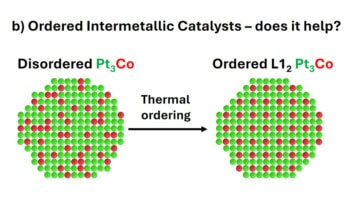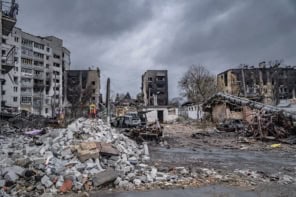Available to watch now, IOP Publishing explores innovative solutions in renewable energy
Want to learn more on this subject?

Join us for an exciting webinar, chaired by Katherine Villa Gomez (ICIQ). This event explores innovative solutions in renewable energy, focusing on cutting-edge research in electrochemical energy conversion, advanced solar fuel technologies, and the integration of water splitting with renewable energy systems. Delve into the future of sustainable strategies as we examine new materials and methods that promise to redefine our approach to energy generation and usage, paving the way for a cleaner, more sustainable world.
The webinar format will feature brief presentations from each panellist, showcasing some of their most exciting work in the field. Following these insightful talks, there will be a dynamic Q&A session, offering attendees the unique opportunity to engage directly with the panel and ask questions about their groundbreaking research and visions for the future of renewable energy.
Want to learn more on this subject?

Katherine Villa obtained her PhD in chemistry at the Autonomous University of Barcelona. After two research positions at the Catalonia Energy Research Institute and Institute for Bioengineering of Catalonia, she joined the Center for Advanced Functional Nanorobots at the University of Chemistry and Technology, Prague (Czech Republic), where she worked as a senior scientist for three years. Recently, she moved back to Spain, where she is currently group leader at the Institute of Chemical Research of Catalonia (ICIQ). Her scientific trajectory has been recognized by several awards and distinctions (Young Researcher Award-RSEQ, Young Academy of Spain, Leonardo BBVA, la Caixa Junior Leader, among others), as well as international competitive funding, including a prestigious ERC Starting Grant 2022 for her project (PhotoSwim). Her research interests include photocatalysis, nanomaterials, renewable energy, micro/nanorobots, and environmental remediation.
Elizabeth A. Gibson, Newcastle University. Libby is a professor of energy materials at Newcastle University. Research in her group focuses on developing materials and devices for sustainable power, fuel and feedstocks. This involves materials development, device assembly and characterization of the underpinning photophysics and electrochemistry. Her current roles include being the academic lead for the EPSRC Northeast Transient Absorption Spectroscopy & Microscopy Facility, institution director of the EPSRC CDT Renewable Energy at Northeast Universities (ReNU), and she is the engagement lead for the UKRI Interdisciplinary Centre for Circular Chemical Economy.
Sebastian Sprick obtained his PhD in chemistry from The University of Manchester in 2013. He then joined Prof. Andrew Cooper’s Group at the University of Liverpool, first as a post-doctoral research associate and before working in the same group as a research lead. In the summer of 2020, he joined the University of Strathclyde to start his independent research group. His research group has major research interests across a wide spectrum of polymer chemistry, but with a particular interest in addressing challenges in sustainability.
Lluís Soler Turu received his PhD in chemistry from the Autonomous University of Barcelona (UAB) in 2010. He has worked as a senior postdoc researcher at the Universitat Politècnica de catalunya-Barcelona Tech (UPC) since autumn 2014. He is currently serving as Deputy Director of the Specific Center for Hydrogen Research at the UPC. Formerly, from 2012-2014, he joined the IFW Dresden and the Max-Planck-Institute for Intelligent Systems in Stuttgart, Germany, in a postdoc position. With over 60 scholarly articles, 3 book chapters and 4 patents, his current research lines span from heterogeneous catalysis and photocatalysis for green hydrogen production to engineered nanomaterials for enhanced sunlight harvesting. https://futur.upc.edu/LluisSolerTuru
Anna Hankin is a lecturer in the Department of Chemical Engineering at Imperial College London. Her principal interests and expertise are in the science and engineering of electrochemical energy conversion, CO2 reduction and separation processes for industrial effluent treatment and material recycling. Her academic research projects have all been aimed at solving industrial problems and involved experimental and numerical modelling components. The strategy followed in former, current, and future projects is to progress from theoretical assessments of a given problem, to small-scale experimental investigations and process modelling, and then on to system design, operation, characterisation and scale-up. Check out her group website for further information:
https://www.imperial.ac.uk/electrochemical-systems-laboratory/




